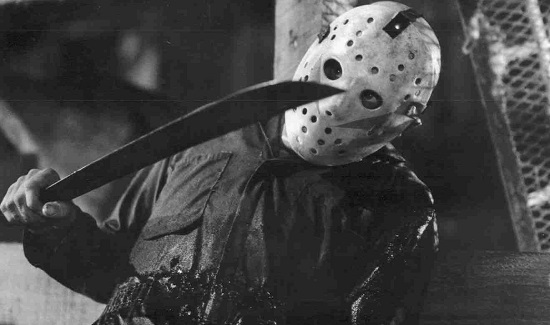Well that’s an auspicious start date for a regular column, eh? Welcome to ‘Flickers’, The Quietus’s new film round up, in which a crack team of mavens from the site’s cinema section will trawl the multiplexes, re-read the release lists and pointlessly attempt to swim upstream against the streaming sites in search of any interesting cinematic events. Think of it as the Camp Crystal Lake of review roundups and remember to pack an icepick. Also, as an attempt to expand The Quietus Cinematic Universe (TM 2014), there is now an open membership Quietus Film facebook group which all are welcome to join, particularly if they enjoy long, pointless arguments over which is better out of Hawk The Slayer and Beastmaster. Or, y’know, Last Year In Marienbad and… The Pink F*cking Panther… or something. Just play nice, is all we ask. You can join it here
It’s extremely warm, innit? And under such sweaty manners it can seem a bit of an inconvenience to be stuck in a dark, humid room watching films with a load of equally ripe strangers. So why risk wasting the Summer evenings? Summer evenings in which you could be running through a meadow, or wackily dancing in a water feature in the town centre in order to melt the heart of that brooding fellow student with the tattoo of a skull and a story to tell. Look below for a round up of some multiplex fare and decide whether it’s worth your time and your hard earned. Then get furiously angry on the above mentioned facebook page when you disagree, chuck around a few gratuitous slurs and will the appearance of The Ban Hammer. And so the wheel rolls and rolls. Get involved.
Oculus (dir: Mike Flanagan. In cinemas now)
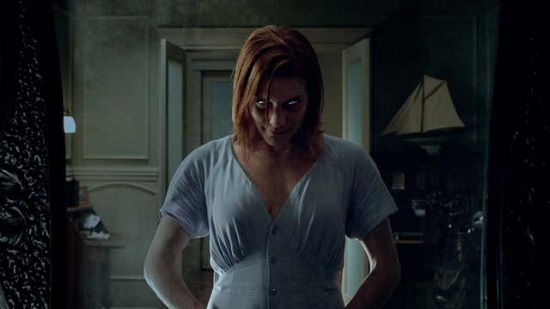
The intersection of superstition and technology is a popular theme for the horror genre, as many films frame their narratives with attempts to document the supernatural using seemingly benign, objective equipment. With the rise in found footage horror, these attempts have become the films themselves, fictional documentaries depicting their own making. But films like this year’s The Quiet Ones (John Pogue) and Mike Flanagan’s Oculus are showing that stepping back from the Paranormal Activity style of storytelling can bring a richness and depth to horror that found footage usually lacks, by reintroducing the detached observation that that genre seeks to eliminate.
Kaylie Russell (Karen Gillan) and her brother Tim (Brenton Thwaites) are survivors of a terrible event that left their parents dead eleven years ago. Kaylie’s grown up in foster care, while Tim’s been in a psychiatric hospital. The conflict between the differing outlooks these environments have given them forms the narrative heart of the film – Tim believes there is a rational, psychological explanation for their parent’s horrible deaths, but Kaylie blames a haunted object, an antique mirror known as the Lasser Glass, believing it tricks anyone who lives near it into destroying themselves. Kaylie is much more troubled and obsessed than her brother, and has spent her life trying to acquire the mirror again so she can document its evil before destroying it. For each, their own explanation is the kinder one; the reality of a father who would kill their mother is worse for Kaylie than a malevolent demon.
If Oculus sounds similar to Alexandre Aja’s Mirrors (2008), don’t worry – it’s a much more satisfying experience. This is a classy, beautifully made film and every performance is terrific.
The story slips effortlessly backwards and forwards in time, with past and present overlapping in a way reminiscent of the films of John Sayles. Adult Kaylie and Tim occupy the same spaces, emotionally and physically, as their younger selves and their parents’ ghosts, and the hold the past has on the present is at least as disturbing as whatever haunts the Lasser Glass.
For a film like this, it’s key that both rational and the supernatural explanations are believable, and Oculus maintains that balance brilliantly. Yasmeen Khan
A Million Ways To Die In The West (dir: Seth MacFarlane. In cinemas now)
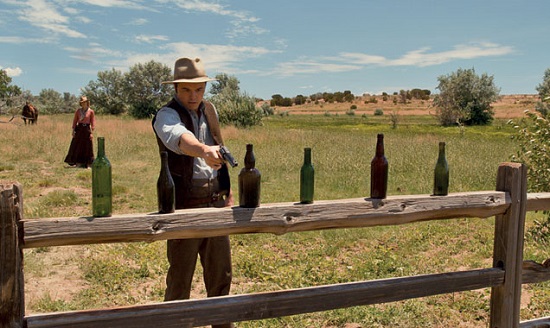
Seth MacFarlane returns to our screens with his rudest, loosest and most infuriating piece of work yet. Finally making an in-the-flesh appearance on film, after making the face behind Peter Griffin a household one via an enormously controversial hosting slot at last year’s Academy Awards, A Million Ways to Die in The West is in many ways MacFarlane’s debut. 2012’s hugely successful Ted may have featured that pop culture-ready voice, but by way of a period Western filled with foul-mouthed characters, here MacFarlane can finally – unfortunately – be himself.
MacFarlane plays the hapless Albert, a sheep farmer with few friends and zero prospects, who constantly feels as if he’s been born in the wrong century. When he meets the mysterious Anna (Charlize Theron, further proving her comedic chops since Arrested Development) his world gets a whole lot more dangerous, as Liam Neeson’s trigger-happy Clinch enters town. The trouble is, none of the plot is this straightforward; we’re treated to endless sideline gags and ‘character moments’, none of which register, resulting in a shapeless movie completely devoid of invention.
The problems arise within the first few minutes. Most movies tend to set their tone as early as possible, and comedies are no exception; within its first second, a hilariously off-tune wail announces the political incorrectness of Borat. Even 22 Jump Street opens with a winking ‘previously on…’ sequence. But nowhere amid the scrawling mountainous backdrops and saloon-door typefaces of the opening of A Million Ways… is anything set in motion. There is only a gaping, yawning nothing. It might be considered trite to judge a movie on its opening credits, even unfair perhaps; but it’s entirely emblematic of the rest of its near two-hour run time, where thin jokes and easy slurs cover up a vacuous core where wit and heart have no place.
Lacking the craftsmanship requisite of the most rudimentary directorial duties, and promoting lazy screenwriting in the form of jokes that hinge on gross-out rather than set-up and pay-off, Seth MacFarlane has once again proved he is the master of getting the audience to laugh when nothing is funny. At the very least, that urges some sick kind of respect for the man. Gary Green
The Dirties (dir: Matthew Johnson. In cinemas now)
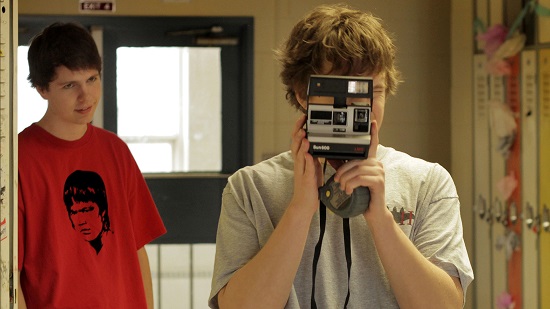
You might think that you’d be hard pressed to find a film that tackles the subject of teen gun violence from a humorous perspective, but The Dirties’inventiveness and wit only adds to the impact of its anti-violence message.
When movie-obsessed geeks Matt (Matt Johnson) and Owen (Owen Williams) have to make a film for a high school project they take the opportunity to get back at ‘The Dirties,’ a bunch of bullies who, verbally and physically, make their lives a misery. They cast themselves as two gun-toting detectives bent on taking down the perps, with a story featuring expletives, a coke den, and a seedy nightclub, complete with a crotch-flashing cabaret singer, played by Matt in drag. When their low-budget epic gets the censorship treatment Matt and Owen vent their frustrations by scheming up the plan for real. Except that Matt takes the joke too far.
What we end up with is a film within a film, which turns into a documentary within a film, that’s presented as ‘found footage.’ This is post-post modernism at play, and a parody of the hackneyed found footage genre. At the start of the film the usual disclaimer-style title card ominously pops up, but from then on The Dirties surprises with its soft heart, and makes you forget that you’re watching two potential killers. Nice guys can’t be the bad guys, right?
Matt Johnson, the 28 year-old who co-wrote, stars in, edits and directs the film, has cleverly combined artifice and authenticity (much of the action was improvised, and Johnson directed himself and the other actors on camera) to create a gutsy movie that feels new. Johnson and his team’s love of film is evident, with great closing titles, one-liners and re-enactments of scenes from The Usual Suspects and Being John Malkovich. It also has the fuzzy, familiar atmosphere of an 80s buddy movie, complete with sleepovers, ridiculous chat-up tricks, bike rides, locker room japes, campfires and target practice with a gun-crazy cousin. Oh, wait…
The attention to detail doesn’t stop with movie trivia. The Dirties also dissects the process of filmmaking itself: anyone who’s ever made a no-budget film will recognise the production checklist on the whiteboard, the fiddly clip mics, the re-setting to shoot other angles, and of course, the tedious desktop edit. Johnson even uses this premise to squeeze humour out of ever-darkening situations, right up to the setting up of GoPro cameras in the school hallways and making sure the optimal framing is secured for the grand finale. The Dirties may not leave you with a bloody nose, but it will give you a Chinese burn that stings even after the closing credits. Nadia Attia
The Sacrament (dir: Ti West, In cinemas now)
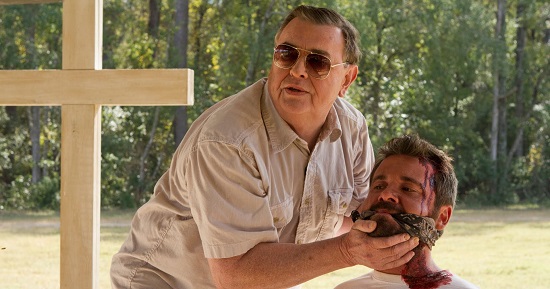
As Martin Scorsese recently found out following the abominable Wolf Of Wall Street, making a film about tragic real life events – especially ones that are still in living memory – is always going to present ethical problems. But when you’re dealing with a situation as pointlessly horrific as the Jonestown massacre then you’re risking coming across as insensitive at best and a complete tool at worst. Thankfully director Ti West has put pretty much the right mix of chutzpah and sensitivity into The Sacrament and the result just (just) stays on the right side of thrilling, while still allowing for a suitably bleak and uncomfortable ride.
It wouldn’t be fair to label The Sacrament a ‘found footage’ horror film (indeed the term ‘mockumentary’ might be more appropriate), but the hand held camera techniques and suspension of disbelief required on the part of the viewer ("PUT THE F*CKING CAMERA DOWN AND RUN!!!") are all present and correct. AJ Bowen and Joe Swanberg play Vice journalists despatched to a commune called Eden Parish to investigate the disappearance of their friend Patrick (Kentucker Audley)’s sister. Once there they are introduced to the camp’s charismatic leader, Father, (played with terrifying conviction by Gene Jones) and become increasingly unsettled by the hold he appears to have over the Parish’s residents.
Once the main players are all established the film rapidly takes a turn for the tragic, with the tension brutally and skillfully maintained. This, however leads to consideration of the film’s more troubling aspects: what does it mean if a director decides that real life events aren’t horrific enough for his needs and starts to embellish? Were the events of Jonestown not terrible enough without West having to add self-immolation and throat slittings to the equation? Of course, you could argue that The Sacrament is not really a film about Jonestown at all, but merely one that borrows (heavily) from real life events. To be honest, I’m not sure I find that argument any less bothersome. Any way that you cut it we’re talking entertainment based on a massacre. Undoubtedly the directing is extremely deft and these troubling embellishments are never allowed to get the upper hand of the story being told, but I can’t help but get the nagging feeling that down this road there’s a film called Vampires Of Belsen lying in wait.
What saves The Sacrament from being merely poisonous exploitation is how it makes you feel. It’s a resoundingly melancholic film that leaves a long, gloomy shadow in its wake. Thankfully it isn’t so much the brutal imagery that stays with you, but more the sensation of hopelessness and dread that accompanies it. Ti West is one of the most interesting young directors working at the moment and, while I still think he’s yet to make his masterpiece, The Sacrament is certainly a step in the right direction. Go and see it, just don’t expect to be untroubled. But then I suppose that’s what horror is all about, right? Mat Colegate
The Quietus Film Facebook group can be found here

